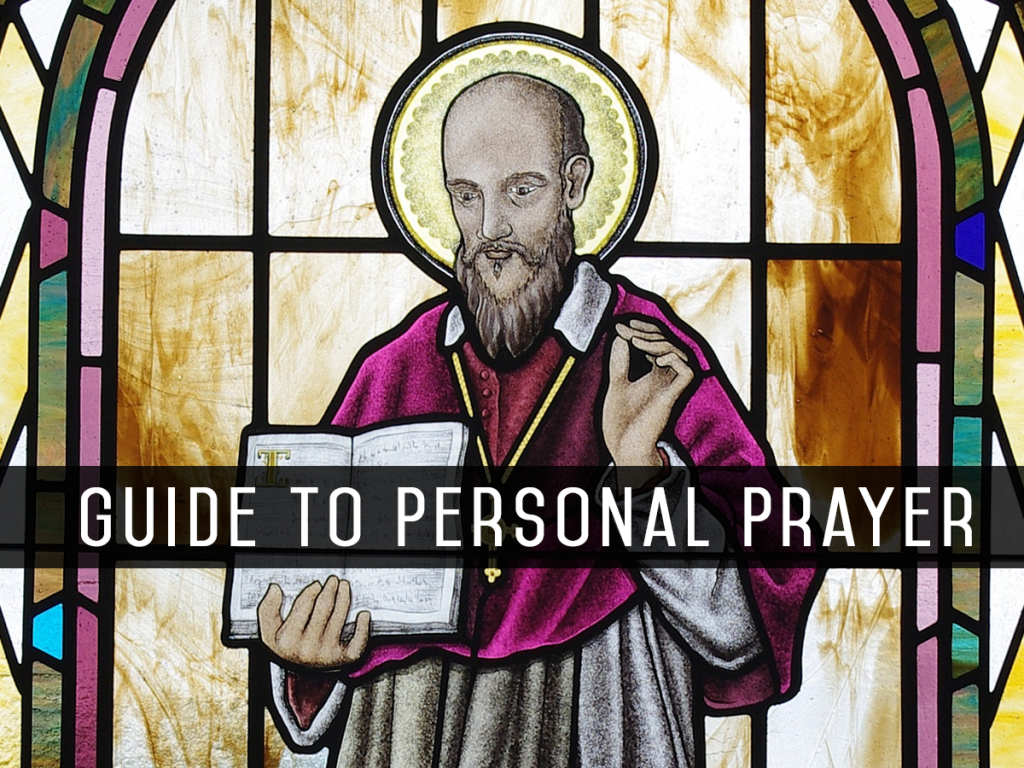Many spiritual writers, including the saints, offer suggestions concerning methods on prayer. Francis de Sales, very much influenced by his own experience of St. Ignatius’s Spiritual Exercises, offers some suggested structures and formats for the practice of meditation and prayer. He suggests six steps as a guide to moving through a time of prayer.
- Place yourself in the presence of God. Remember that God is near, not far away. He is in the very depth of your heart, your spirit. “Begin all your prayers whether mental or vocal in the presence of God. Keep to this rule without and exception and you will quickly see how helpful it will be.”
- Ask the Lord to help you pay attention to Him, to open yourself up to His Word and presence.
- Pick out a passage from Scripture, a scene from a Gospel, a mystery of the Faith, or a passage from some spiritual reading. If the subject matter you have chosen lends itself to it, picture yourself in the same place as the action or event that is happening. Use your imagination to place yourself in the midst of the scene near Jesus, with the disciples.
- Think about what you’ve chosen to meditate on in such a way as to increase your love for the Lord or for virtue. The purpose is not primarily to study or know more, but to increase your love for God and the life of discipleship.
- If good affections should rise up-gratitude for God’s mercy, awe at His majesty, sorrow for sin, desire to be more faithful, for example-yield to them.
- Come to some practical resolutions concerning changes you would like to make as a response to these affections. For example, resolve to be more faithful in prayer, or more ready to forgive, or more eager to share the faith with others, or more determined to resist sin, in as practical and concrete a way as you can determine.
“Most of all, after you rise from meditation you must remember the resolutions and decisions you have made and carefully put them into effect on that very day. This is the great fruit of meditation and without it meditation is often not only useless but even harmful. Virtues meditated on but not practiced sometimes inflate our minds and courage and we think that we are really such as we have thought and resolved to be.”
Francis recommends that we end the time of meditation-prayer with expressions of gratitude to God for the light and affections He has given us in our time of prayer; then, an offering of ourselves to the Lord in union with the offering of Jesus; and thirdly, a time of intercession for our self and others.At the same time, Francis doesn’t intend that the structure or method he proposes be followed mechanically if the Holy Spirit draws us to something different.
“It may sometimes happen that immediately after the preparation you will feel that your affections are drawn wholly towards God. In this case you must give them free rein and not follow the method I have shown you. Ordinarily, consideration must precede affections and resolutions. However, when the Holy Spirit gives you the affections before the consideration, you must not look for the consideration since it is used only to arouse the affections. In a word, whenever the affections present themselves you must accept them and make room for them whether they come before or after the considerations.”
While Francis acknowledges the usefulness of praying the Rosary, various litanies, and fixed, written prayers, he advises us to always give the priority to mental prayer and the leading of the Holy Spirit.
“However, if you have the gift of mental prayer, you should always give it first place. Afterwards if you cannot say your vocal prayers because of your many duties or for some other reason don’t be disturbed on that account. . . . During vocal prayer if you find your heart drawn and invited to interior or mental prayer, don’t refuse to take it up. Let your mind turn very gently in that direction and don’t be concerned at not finishing the vocal prayers you intended to say. The mental prayer you substitute for them is more pleasing to God and more profitable for your soul.”
Francis makes an exception in his general advice regarding flexibility in prayer, as does Catherine of Siena: those in Holy Orders or by virtue of a rule of religious life are obligated to pray the Divine Office must keep their commitment.
. . .
 The above excerpt was taken from Ralph Martin’s book The Fulfillment of All Desire: A Guidebook for the Journey to God Based on the Wisdom of the Saints. For more great wisdom, pick up a copy today! Buy Now»
The above excerpt was taken from Ralph Martin’s book The Fulfillment of All Desire: A Guidebook for the Journey to God Based on the Wisdom of the Saints. For more great wisdom, pick up a copy today! Buy Now»







I would like to receive light in the darkness to share with an atheist person I will try to share it with him.
Dear Elizabeth, Thank you for sharing Light in the Darkness. You can receive one free copy here: https://www.renewalministries.net/?module=Store&class=Cart&Info=Free+booklet+has+been+added+to+your+cart.
You also can order additional copies at Renewal Ministries’ online store, here: https://www.renewalministries.net/?module=Store&event=Details&productID=432
God bless you!